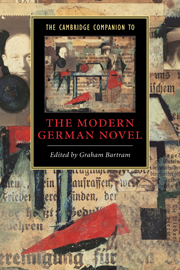Book contents
- Frontmatter
- 1 The German novel in the long twentieth century
- 2 Contexts of the novel
- 3 The novel in Wilhelmine Germany
- 4 Gender anxiety and the shaping of the self in some modernist writers
- 5 Franz Kafka
- 6 Modernism and the Bildungsroman
- 7 Apocalypse and utopia in the Austrian novel of the 1930s
- 8 Images of the city
- 9 Women writers in the ‘Golden’ Twenties
- 10 The First World War and its aftermath in the German novel
- 11 The German novel during the Third Reich
- 12 History, memory, fiction after the Second World War
- 13 Aesthetics and resistance
- 14 The kleiner Mann and modern times
- 15 The ‘critical’ novel in the GDR
- 16 Identity and authenticity in Swiss and Austrian novels of the postwar era
- 17 Subjectivity and women’s writing of the 1970s and early 1980s
- 18 The postmodern German novel
- Index
- Series List
10 - The First World War and its aftermath in the German novel
Published online by Cambridge University Press: 28 May 2006
- Frontmatter
- 1 The German novel in the long twentieth century
- 2 Contexts of the novel
- 3 The novel in Wilhelmine Germany
- 4 Gender anxiety and the shaping of the self in some modernist writers
- 5 Franz Kafka
- 6 Modernism and the Bildungsroman
- 7 Apocalypse and utopia in the Austrian novel of the 1930s
- 8 Images of the city
- 9 Women writers in the ‘Golden’ Twenties
- 10 The First World War and its aftermath in the German novel
- 11 The German novel during the Third Reich
- 12 History, memory, fiction after the Second World War
- 13 Aesthetics and resistance
- 14 The kleiner Mann and modern times
- 15 The ‘critical’ novel in the GDR
- 16 Identity and authenticity in Swiss and Austrian novels of the postwar era
- 17 Subjectivity and women’s writing of the 1970s and early 1980s
- 18 The postmodern German novel
- Index
- Series List
Summary
Erleben tun es viele, gestalten kann es niemand (Many experience it, no one can describe it)
Paul Feldkeller, 1915Given the political circumstances in Germany between the end of the First World War and the Nazis' assumption of power, any treatment of the experience of serving at the Front – literary or otherwise – was automatically political. There were vested interests on both the left and the right, but especially the latter, in making the war experience work to the advantage of ideology. Hence, in the first years of the Weimar Republic, and then again towards the end of the 1920s, the war as a literary topic was predominantly the domain of nationalist elements, all the more so because of the historical role of militarism in the Prussian ethos. For these elements, who clung to the view that the German army had remained 'undefeated in the field', the experience of the war was to be esteemed as a forcing ground for völkisch values, which would come into their own once the compromise of Weimar had been overcome.
- Type
- Chapter
- Information
- The Cambridge Companion to the Modern German Novel , pp. 138 - 151Publisher: Cambridge University PressPrint publication year: 2004
- 1
- Cited by



